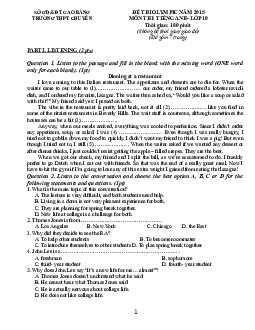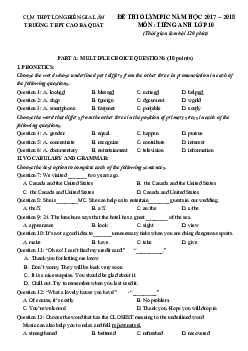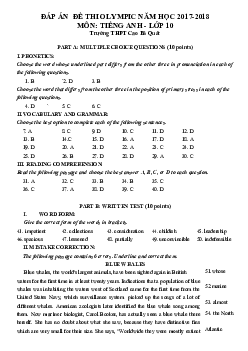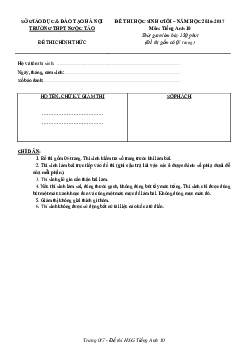









Preview text:
SỞ GIÁO DỤC VÀ ĐÀO TẠO BÀ RỊA VŨNG TÀU
KỲ THI OLYMPIC TRUYỀN THỐNG 30/4
TRƯỜNG THPT CHUYÊN LÊ QUÝ ĐÔN
LẦN THỨ XVIII NĂM 2012
Khóa ngày 07 tháng 4 năm 2012 ĐỀ CHÍNH THỨC
Môn thi: Tiếng Anh lớp 11
Thời gian làm bài: 180 phút, không kể thời gian phát đề Chú ý:
− Đề thi này có 10 trang,
− Học sinh làm bài mỗi phần trên một tờ giấy riêng
− Không được sử dụng bất cứ tài liệu nào để làm bài.
A. MULTIPLE CHOICE QUESTIONS I. PHONOLOGY
1. Choose the word whose underlined part is pronounced differently
from that of the others in each group. (5 pts)
1. A. considerate B. candidate C. associate D. adequate
2. A. warranty B. wasabi C. wallop D. wander
3. A. sanctuary B. manky C. sanguine D. redundant
4. A. modal B. model C. modest D. modern
5. A. bathing B. method C. bathroom D. width
2. Choose the word whose main stressed syllable is placed
differently from that of the others in the list. (5 pts) 6. A. disinter B. cadaver C. cathedral D. attorney
7. A. substantial B. technological C. exponential D. infiltration 8. A. monetary B. paralysis C. protagonist D. analogous 9. A. arithmetic B. assassinate C. agriculture D. controvert
10. A. tuberculosis B. mathematician
C. communication D. inheritance
II. VOCABULARY & STRUCTURE
Choose the best answer to complete each of the following sentences (20 pts)
1. What happened _______ their car broke down on the motorway so they didn’t get to Jo’s wedding on time. A. to be that B. being that C. was that D. to that
2. The restaurant is popular with film stars and the _______. A. like B. same C. similar D. such
3. I’m sorry to _______, but did you happen to mention the same “Fiona”? A. butt in B. cut you C. intercede D. jump
4. John was _______ something under his breath, but I didn’t catch what he said. A. whispering B. muttering C. growling D. swallowing
5. Don’t take it as _______ that you’ll be promoted in your job; other colleagues stand a good chance too. A. fixed B. standard C. read D. word Trang 1/10
6. A common cause of _______ is the use of untreated water in preparation for foods, which
is quite common in certain underdeveloped countries. A. displeasure B. malnutrition C. eupepsia D. dysentery
7. The police promised him _______ from prosecution if he co-operated with them fully. A. safety B. protection C. immunity D. absolution
8. Public television stations are different from commercial stations _______.
A. because they receive money differently and different types of shows B. for money and program types
C. in the areas of funding and programming
D. because the former receives money and has programs differently from the latter
9. I don’t think it would be wise to try to make Max change his mind about divorcing
Barbara. Well, in his place I _______ her at all. A. would never have married B. needn’t have married C. would never marry D. must never have married
10. Once known as the “Golden State” because of its gold mines, _______.
A. North Carolina today mines few metallic minerals
B. few metallic minerals are mined in North Carolina today
C. there are few metallic minerals mined in North Carolina today
D. today in North Carolina few metallic minerals are mined
11. Charles Babbage’s “difference engine” is widely regarded as the _______ of modern computers. A. precedent B. precursor C. ancestor D. antecedent
12. According to psychiatrists, many violent criminals harbor a feeling of _______ and insecurity. A. insufficiency B. shortage C. inadequacy D. scarcity
13. It must be true. I heard it straight from the _______ mouth. A. dog’s B. horse’s C. camel’s D. cat’s
14. I am fully prepared for my interview and I am confident that I can answer any questions they may care to _______ me. A. throw at B. drop on C. slide to D. roll to
15. I’m afraid we have _______ a lot of criticism over our decision to close the hospital. A. come in for B. come round
C. come out with D. come up with
16. She was unaware that she had been under _______ since her arrival. A. review B. consideration C. discussion D. surveillance
17. The saucepan fell onto the floor with a great _______. A. clatter B. whoosh C. crunch D. squeak
18. I thought that Wendy’s action was rather out of _______. A. personality B. character C. being D. role
19. The planes were delayed and the hotel was awful, but _______ we still had a good time. A. on the contrary B. by the same token C. on top of all that D. for all that
20. Unsalted butter is best for this recipe, but _______ that, margarine will do. A. except B. failing C. for all of D. given III. READING COMPREHENSION Reading 1 Trang 2/10
You are going to read a newspaper article. For questions 1 – 10,
choose the answer (A, B, C or D) Which you think fits best according to the text. (10 pts)
How I found my true voice
As an interpreter, Suzanne Glass could speak only for others – but the work provided terrific
material for her first novel.
‘No, no, no! You’ve got to get away from this or you’re going to lose it.’ The voice
reverberating in my head was my own. I was at an international conference. My throat was
killing me and my headphones were pinching. I had just been interpreting a speaker
whose last words had been: ‘We must take very seriously the standardization of the
length of cucumbers and the size of tomatoes.’ You can’t afford to have your own
thoughts when you’re interpreting simultaneously, so, of course, I missed the speaker’s
next sentence and lost his train of thought. Sitting in a darkened booth at the back of a huge
conference hall, I was thrown. Fortunately, my colleague grabbed my microphone and took over.
This high-pressure, high-output work was not quite the dream profession I had hoped for.
Although I had fun with it in the beginning – occasionally being among the first to hear of
medical and political breakthroughs would be exciting for any 25-year-old –I realized that this
was a job in which I would never be able to find my own voice. I had always known that words
would be my life in one form or another. My mother thought she’d given birth to an alien
when I began to talk at the age of seven months. That momentous day, she had placed my
playpen in the hallway and gone into the bedroom. In imitation of the words she had repeated to
me again and again, I apparently called out towards the bedroom door: ‘I see you. I see
you.’ I was already in training for a career as a professional parrot.
But how mistaken I was to think that international interpreting would be glamorous. The
speaker rarely stops to think that there’s someone at the back of the room, listening to his
words, absorbing their meaning, and converting them into another language at the same
time. Often I was confronted with a droner, a whisperer or a mumbler through my headphones.
The mumblers were the worst. Most of the time, an interpreter is thought of as a machine – a
funnel, a conduit, which, I suppose, is precisely what we are. Sometimes, when those we are
translating for hear us cough or sneeze, or turn round and look at us behind the smoky glass of
the booth, I think they’re surprised to see that we’re actually alive.
Ironically, part of the secret of interpreting is non-verbal communication. You have to sense
when your partner is tired, and offer to take over. At the same time, you have to be careful not to
cut him short and hog the microphone. Interpreters can be a bit like actors: they like to show
off. You do develop friendships when you’re working in such close proximity, but there’s a
huge amount of competitiveness among interpreters. They check on each other and sometimes
even count each other’s mistranslations.
Translating other people’s ideas prevented me from feeling involved and creative as an
interpreter. Actually, you can’t be a creative interpreter. It’s a contradiction in terms.
Sometimes, when I disagreed with a speaker, I wanted to rip off my headphones, jump up
and run out of the booth, shouting: ‘Rubbish. Rubbish. You’re talking a lot of nonsense, and
this is what I think about it.’ Instead, I had to sit there and regurgitate opinions in violent
contradiction with my own. Sometimes, I’d get my revenge by playing games with the
speaker’s tone of voice. If he was being serious, I’d make him sound jocular. If he was being
light-hearted, I’d make him sound earnest. Trang 3/10
Eventually, I wanted to find a career where my own words would matter and where my
own voice would be heard. So, to redress the balance, I decided to write a novel. While I was
writing it, I did go back and interpret at a few conferences to get inside the head of
Dominique, my main character. At first, I was a little rusty and a couple of the delegates
turned round to glare at me, but after twenty minutes, I was back into it, playing that old game
of mental gymnastics. Interpreting is like learning to turn somersaults: you never forget how to
do it. But for me, sitting in the booth had a ghost-like quality to it – as though I had gone back
into a past life - a life that belonged to the time before I found my own voice.
1. In the first paragraph, the writer says she discovered that
A. there were some subjects she had no interest in dealing with.
B. the standard of her work as an interpreter was getting lower.
C. her mind was wandering when she should have been doing her job.
D. she could no longer understand subjects she had previously covered.
2. What does the writer say about being an interpreter in the second paragraph?
A. It was the kind of job her parents had always expected her to do.
B. It turned out to be more challenging than she had anticipated.
C. It was what she had wanted to be ever since she was a small child.
D. It gave her access to important information before other people.
3. What does the writer say about speakers she interpreted for?
A. Some of them had a tendency to get irritated with interpreters.
B. She particularly disliked those she struggled to hear properly.
C. They usually had the wrong idea about the function of interpreters.
D. Some of them made little attempt to use their own language correctly.
4. The writer says that relationships between interpreters
A. can make it difficult for interpreters to do their jobs well.
B. are affected by interpreters’ desires to prove how good they are.
C. usually start well but end in arguments.
D. are based on secret resentments.
5. The writer says that when she disagreed with speakers, she would sometimes
A. mistranslate small parts of what they said.
B. make it clear from her tone of voice that she did not agree.
C. exaggerate their point of view.
D. give the impression that they did not really mean what they said.
6. The writer says that when she returned to interpreting,
A. she did not start off very well.
B. she briefly wished she had not given it up.
C. she thought that two of the delegates recognised her.
D. she changed her ideas about the main character in her novel.
7. What is the writer’s main point in the article as a whole?
A. It is not always a good idea to go into a profession because it looks glamorous.
B. Most interpreters eventually become disillusioned with the work.
C. Being an interpreter did not allow her to satisfy her need to be creative.
D. Most interpreters would actually like to do something more creative.
8. Which is the closest in meaning to momentous in ‘That momentous day’? A. unimportant B. historic C. momentary D. hard
9. Which is the closest in meaning to ‘to glare’? A. to glower B. to caress C. despise D. wonder Trang 4/10
10. Which is the closest in meaning to ‘simultaneously’? A. all again B. all at once
C. once and for all D. once too often Reading 2
Read the following passage and fill in each blank with a suitable
phrase or sentence from the list below. (10 pts) Bringing up children
Where one stage of child development has been left out, or not sufficiently experienced, the
child may have to go back and capture the experience of it. (1) _________ - for example, by
providing the opportunity for the child to play with a clockwork car or toy railway train up to
any age if he still needs to do so. This principle, in fact, (2)_________ of children in difficulties
with their development, and is the basic of work in child clinics.
The beginnings of discipline are in the nursery. Even the youngest baby is taught by gradual
stages to wait for food, to sleep and wake at regular intervals and so on. If the child feels the
world around him is a warm and friendly one, he slowly accepts its rhythm and accustoms
himself to conforming to its demands. (3) __________, particularly for food, is a very important
element in upbringing, and is achieved successfully only if too great demands are not made
before the child can understand them. Every parent watches eagerly the child's acquisition of
each new skill: the first spoken words, (4)_________, or the beginning of reading and writing. It
is often tempting to hurry the child beyond his natural learning rate, but this can set up
dangerous feelings of failure and states of anxiety in the child. This might happen at any stage.
A baby might be forced to use a toilet too early; a young child might be encouraged to learn to
read before he knows the meaning of the words he reads. On the other hand, though, if a child is
left alone too much, (5) __________, he loses his natural zest for life and his desire to find out new things for himself.
Learning together is a fruitful source of relationship between children and parents.
(6)____________. Toys and games which both parents and children can share are an important
means of achieving this co-operation. Building-block toys, jigsaw puzzles and crosswords are good examples.
Parents vary greatly (7) _________ towards their children. Some may be especially strict in
money matters; others are severe over times of coming home at night, punctuality for meals or
personal cleanliness. In general, the controls imposed represent the needs of the parents and the
values of the community (8) ___________.
With regard to the development of moral standards in the growing child, (9) __________. To
forbid a thing one day and excuse it the next is no foundation for morality. Also, parents should
realize that “example is better than precept”. If they are hypocritical and do not practice what
they preach, their children may grow confused and emotionally insecure (10) _________, and
realize they have been, to some extent, deceived. A sudden awareness of a marked difference
between their parents' ethics and their morals can be a dangerous disillusion.
The list of phrases and sentences
A. in their degree of strictness or indulgence
B. consistency is very important in parental teaching
C. or without any learning opportunities
D. underlies all psychological treatment Trang 5/10
E. By playing together, parents learn more about their children and children learn more from their parents
F. Learning to wait for things
G. as much as the child's own happiness and well-being
H. when they grow old enough to think for themselves
I. A good home makes this possible
J. the first independent steps IV. GUIDED CLOZE TEST
Read the following passage and choose the options that best
complete the blanks. (10pts)
Warning on global warning
Global warning could cause drought and possibly famine in China, the source of much of
Hong Kong’s food, by 2050, a new report predicts. Hong Kong could also be (1)
__________ from flooding as sea level rose. The report (2) __________ building sea-walls
around low-lying areas such as the new port and airport reclamations. (3) __________ by
the world Wide Fund of Nature (WWF), the report, which includes work by members of
the Chinese Academic meteorological Sciences, uses the most recent projections on
climate change to point to a gloomy (4) __________ for China.
By 2050 about 30 to 40 per cent of the country will experience changes in the type of
vegetation it (5) __________, with tropical and subtropical forest conditions (6)
__________ northward and hot desert conditions rising in the west where currently the
desert is temperate, crop-growing areas will expand but any benefit is expected to be
negated by increased evaporation of (7) __________, making it too dry to grow crops such
as rice. The growing season also is expected to (8) __________, becoming shorter in
southern and central China, the mainland’s (9) __________. The rapid changes make it
(10) __________ that plants could adapt. 1. A. at a loss B. at risk C. at it again D. at random 2. A. comments B. realizes C. agrees D. recommends 3. A. To publish B. Having published C. Published D. Publishing 4. A. outlook B. perspective C. view D. sight 5. A. supports B. grows C. raises D. rises 6. A. running B. shifting C. dashing D. rushing 7. A. land B. soil C. moisture D. humid 8. A. reshape B. remain C. rotate D. alter
9. A. breadwinner B. breadline C. breadbasket D. breadboard
10. A. unforthcoming B. unlikely C. unchanged D. unregulated B. WRITTEN TEST I. VERB TENSES / FORMS
Put each verb in brackets in the correct tense or form (10 pts)
- I don’t think his article deserves (1. read) _________ Trang 6/10
- It was our fault to keep Jane (2. wait) _________ so long. We (3. inform) _________. her in advance.
- It’s no use (4. ask) _________ the students (5. keep) _________ quiet. They can’t help (6. make) _________ a noise.
- I would rather you (7. not / be) _________ absent from class yesterday.
- Neither industries nor the garbage disposal (8. account) _________ for the pollution in this city.
- All the lights are on. You (9. forget) _________ (10. turn) _________ the lights off before going to bed last night.
Put each verb in brackets in the correct tense or form (10 pts)
Johannes Gutenberg was a pioneer in the use of movable type. When he (1. begin)
__________ building a printing press in 1436, he (2. be) __________ unlikely (3. realize)
___________ that he (4. give) ___________ birth to an art form that (5. take) _________ center
stage in the social and industrial revolutions that followed.
Gutenberg was German, his press was wooden, and the most important aspect of his invention
was that it was the first form of printing to use movable type. Although Laurence Koster of
Harlem also (6. lay) __________ claim to the invention, scholars (7. generally / accept)
_________ Gutenberg as the father of modern printing. Before Gutenberg, the printing press (8.
use) __________ (9. reproduce) __________ pictures, playing cards, and designs on cloth.
Designs (10. cut) _________ in wood, stone or metal and transferred to parchment or vellum. II. WORD FORMS
Give the correct form of words in brackets (10 pts)
1. “What if” questions involving _________ are familiar in historical speculations. (FACT)
2. He was definitely _________ when he scored that goal. (SIDE)
3. You won’t persuade him to change his mind. His decision is _________ (REVOKE)
4. Are season-ticket _________ dealt here? (NEW)
5. The Ministry of Education and Training decided to organize a (an) _________ footballer
championship to create a common playground for all students. (COLLEGE)
6. An alarm sounds when the temperature reaches a _________ level. (DETERMINE)
7. Scarlet, my new neighbor, tends to have intense, _________ friendships. (SPIRIT)
8. It is not surprising that the corporation has established total _________ over its rivals. (SUPREME)
9. He examined the parcel _________ as he had no idea what it could be. (SUSPECT)
10. Each classroom in my school has been _________ with a high-quality projector. (FIT)
Supply each gap with the correct form of the word given in the box (10 pts) way excel movable nature precede subversive precocity subjection demolition breed
Little queens sweep the board Trang 7/10
'Hot-housing' is the technical word for it – but the (1) _________ Polgar sisters from Hungary,
who have been zapping the male chess community, certainly don't look like (2) _________ hot- house blossoms.
Judit, 12, who won men's international master status at the (3) _________ age of 11 (three
years earlier than Bobby Fischer and Gary Kasparov), and Zsofi, who has just become a
women's grandmaster at 13 (another record), started playing chess before they were five, never
went to school, were educated by their parents, and now put in five or six hours a day at the
board. They seem very natural children. Between (4) _________ in the Duncan Lawrie mixed
tournament, which ends today at London's Ecclestone Hotel, they jump up for a gossip or a joke
together. Their elder sister Zsuzsa, back in Budapest, is (5) _________ to men's international
grandmaster status at the age of 19. The three girls, who will represent Hungary at the Chess
Olympiad in Salonika in two weeks' time, have begun to (6)_________ the assumption that, at
the top level of world chess, men will always prevail.
Their father, Laszlo, once a lecturer in psychology, now their business manager, wanted to test
the hot-housing theory that if you (7) _________ a normally intelligent child to intensive,
specialized training in a particular discipline at a very early age, you will produce (8)
_________. His claim that his daughters were not endowed by nature with any special
intellectual gifts is central to his argument. The girls' mother, Klara, a language teacher, says:
'It's improbable that three children in the same family would all be (9) _________ gifted. They
are normal – just like other children, except that they spend more time concentrating on chess.
We hope one of them will be world champion one day.'
The Polgar blitz on male dominance has (10)_________ some old physiological and
psychoanalytical explanations of women's inferiority in top-level chess, and is likely to
encourage other parents to push their daughters. Sooner or later, this should produce a woman world champion.
III. PREPOSITIONS AND PHRASAL VERBS
Fill in each blank with a suitable preposition or particle (10 pts)
1. These boots can be ordered directly __________ the manufacturers.
2. He escaped by passing himself __________ as a guard.
3. She refused to be a party __________ any violence.
4. Her sense of fun has rubbed __________ on her children.
5. We cannot afford to take risks when people’s lives are __________ stake.
6. Embarrassment rooted her __________ the spot.
7. The school ran __________ financial trouble when eighty percent of the staff went on strike.
8. Erica is an excellent colleague. She goes __________ her job calmly and efficiently.
9. There should be enough plates to go __________.
10. Hundreds of people turned __________ in the rain to see their favorite pop star. IV. ERROR IDENTIFICATION
Identify 10 errors in the following passage and correct them (10 pts) THE TRUTH ABOUT LOVE
This week we celebrated Valentine’s Day or rather incurable romances and those of us who are
a bit soft in the head did! The fourteenth of February always gives everyone who’s anyone a
chance to cast a few pearls of wisdom before their fellow sufferers about the nature of ‘the Trang 8/10
universal migraine’ – love. Francis Farnsworth is the case in point. I’m sure the poor old fellow
has a heart of gold but he really does talk a load of rubbish sometimes! His appearance last night
on BBC 1’s ‘Let’s Talk It Over’ was not exception. He started out by having what I will politely
call a difference of opinion with Tania Di Monte, author of ‘Tell me the Truth about love’. Ms.
Di Monte always expresses the most extraordinary views without any apparent fear of
contradiction. Last night she was boldly set out her rules for a perfect relationship when poor old
Farnsworth accidentally called her Tina. Tina is of course the name of her ex-husband Darren’s
second wife and we all know that any mention him – or her – is like a red rag to a bull to Tania.
Farnsworth kept apologizing and saying that it had been a slip of the tongue brought about by a
momentary loss of concentration, but it took all presenter Greg Lazarre’s skills to calm our
Tania down again. Francis then started calling her ‘darling’, which only succeeded in making
her even more furious. ‘Term of endearing’, he stammered as she glared at him. She had been
vehemently denying that there was even a grain of truth in rumors about her forthcoming
engagement with football star Nick Pérez. Nevertheless, I’m sure it is only a question of time
before we see Tania and Nick on the cover of ‘Hi There!’ celebrating ‘the wedding of the
century’. If marrying someone like Tania is what happens to you if you’re incredibly successful,
like Pérez undoubtedly is, I shudder thinking what the price of failure might be! V. OPEN CLOZE TEST
Fill in each blank with one suitable word (10 pts)
Can parrots communicate?
Everyone knows that parrots can imitate human speech, but can these birds also understand
meaning? Two decades ago, researcher Irene Pepperberg started working with Alex, an African
grey parrot, and ever since then, she has been building (1) __________ data on him.
Pepperberg, whose recently published book The Alex Studies makes fascinating reading,
claims Alex doesn’t copy speech but intentionally uses words to get (2) __________ it is that he wants.
In actual (3) __________, some of his cognitive skills are identical to those of a five-
year-old child. (4) __________ a child’s, Alex’s learning has been a steady progression.
Early on, he (5) __________ vocalize whether two things were the same or different.
Now, he carries out more complex tasks. Presented (6) __________ different-coloured
balls and blocks and asked the number of the red blocks, he’ll answer correctly. He
requests things as well. (7) __________ he ask to sit on your shoulder and you put him (8)
__________ else, he’ll complain: “Wanna go shoulder.”
A few experts remain skeptical, seeing very (9) __________ in Alex’s performance
beyond learning by association, by means of intensive training. Yet Alex appears to have
mastered simple two-way communication. As parrots live for 60 years or more, Alex may
surprise (10) __________ all further.
VI. SENTENCE TRANSFORMATION
Rewrite each of the following sentences in such a way that it
means exactly the same as the one given. (10 pts)
1. I rarely sleep in the afternoon.
I’m not in ……………………………………………….
2. It was not until five years had elapsed that the whole truth about the murder came out.
Not for ……………………………………………… Trang 9/10
3. It seems that no one predicted the correct result.
No one …………………………………………………
4. My grandfather had completely forgotten that he phoned me last night.
My grandfather didn’t have ……………………………
5. I was not well enough to play football that day.
I didn’t feel …………………………………………….
6. Laura was faced by a lot of problems during her childhood. (contend)
Laura had a ……………………………………………..
7. It is usual for young children to ask a lot of questions. (apt)
Young children……………………………………………………………
8. David felt uncomfortable in front of all those people. (ill)
David seemed really ……………………………………….
9. The handling of the matter has been heavily criticized by the press. (scorn)
The press…………………………………………………………….
10. When they broke the news, she stayed perfectly calm and controlled. (hair)
When they broke the news ………………………………………………
−−−−−−−−−−−Hết−−−−−−−−−−−
Học sinh không được sử dụng tài liệu. Giám thị coi thi không giải thích gì thêm.
Họ và tên thí sinh:……………………………… ……….. Số báo danh:…………….... Trang 10/10




